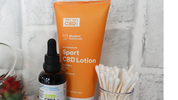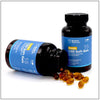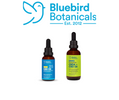The Ultimate Guide to CBD Oil Shopping: Online vs Local Stores Explained

Introduction: Why Choosing the Right CBD Oil Matters
CBD oil has surged in popularity as more people seek natural wellness options. Whether you're looking for CBD oil near me at a local store or exploring full-spectrum CBD oil online, it’s essential to know where to buy high-quality products.
But with so many options, how do you decide between shopping online or in a local store?
This ultimate guide will walk you through the pros and cons of both options, helping you make an informed decision about where to buy CBD oil based on quality, convenience, and transparency.
What This Guide Covers:
-
What is CBD oil, and how is it different from full-spectrum CBD oil?
-
The pros and cons of buying CBD oil online vs locally
-
How to find CBD oil near you that meets quality and safety standards
-
Key factors to consider when shopping for CBD, including lab testing, legal considerations, and reviews
By the end, you’ll have a clear roadmap to choosing the best CBD shopping method that fits your needs.
What is CBD Oil and How Does It Work?
CBD oil is an extract derived from the hemp plant (Cannabis sativa) that contains cannabidiol (CBD)—a naturally occurring compound known as a cannabinoid. Unlike THC (tetrahydrocannabinol), CBD is non-intoxicating, meaning it does not produce a "high."
How CBD Oil Works in the Body
CBD interacts with the endocannabinoid system (ECS), which helps regulate various physiological functions, including:
-
Mood and stress responses
-
Sleep cycles
-
Inflammatory responses
-
Cognitive function
The ECS consists of CB1 receptors (primarily found in the brain and nervous system) and CB2 receptors (mostly in the immune system and peripheral tissues). Unlike THC, which binds directly to CB1 receptors, CBD influences the ECS indirectly, promoting balance without intoxication.
Types of CBD Oil
When shopping for CBD oil, you'll come across different formulations, each offering a unique cannabinoid profile:
1. Full-Spectrum CBD Oil
-
Contains CBD + other cannabinoids (such as CBG, CBN, and trace amounts of THC up to 0.3%)
-
Includes terpenes and flavonoids that contribute to the "entourage effect"
-
Popular among users looking for a more natural and holistic cannabinoid experience
2. Broad-Spectrum CBD Oil
-
Similar to full-spectrum but without THC
-
Retains other beneficial cannabinoids and terpenes
-
A good choice for those who want the entourage effect without THC exposure
3. CBD Isolate
-
Pure 99%+ CBD extract with no other cannabinoids or terpenes
-
Ideal for those who prefer CBD alone without any additional plant compounds
-
THC-free and often used in CBD-infused edibles, topicals, and powders
Buying CBD Oil Online vs. Locally – Pros and Cons

When searching for CBD oil near me, you’ll likely find two main options: purchasing from a local store or ordering online. While both methods have their advantages, understanding the key differences in quality, convenience, and transparency can help you make the right choice.
Buying CBD Oil Online: Pros and Cons
✅ Pros of Buying CBD Oil Online
1. Greater Product Selection
-
Online stores offer a wider variety of CBD products, including full-spectrum CBD oil, broad-spectrum, and CBD isolate.
-
More flavor and potency options compared to local retailers.
2. Access to Lab-Tested Products
-
Reputable online CBD brands provide third-party lab testing results (Certificates of Analysis, or COAs), ensuring transparency.
-
Lab tests verify CBD potency, purity, and absence of harmful contaminants like pesticides and heavy metals.
3. Convenience and Accessibility
-
No need to visit multiple stores—shop from the comfort of your home anytime.
-
Ideal for people in rural areas where high-quality CBD options are limited or unavailable.
4. Competitive Pricing and Discounts
-
Online CBD retailers frequently offer bulk discounts, subscription deals, and promotional codes.
-
Many companies provide free shipping on orders over a certain amount, making it cost-effective.
5. Verified Customer Reviews
-
Buying CBD online allows you to read real user reviews before making a decision.
-
Provides insight into product effectiveness and brand reputation.
❌ Cons of Buying CBD Oil Online
-
No immediate access—shipping times can vary.
-
Hard to inspect products before purchasing—you must rely on lab reports and reviews.
-
Risk of counterfeit products—always buy from reputable brands with verified lab testing.
Buying CBD Oil Locally: Pros and Cons
✅ Pros of Buying CBD Oil in Local Stores
1. Immediate Availability
-
You can purchase CBD oil immediately without waiting for shipping.
-
Ideal for last-minute or urgent CBD needs.
2. Ability to Inspect Products Physically
-
See the packaging and verify labels before purchase.
-
Some health and wellness stores may have knowledgeable staff to assist you.
3. Supporting Local Businesses
-
Buying locally helps support small businesses in your community.
-
Some dispensaries or wellness shops carry locally sourced CBD brands.
❌ Cons of Buying CBD Oil Locally
1. Limited Product Selection
-
Many stores stock only a few brands or low-potency options.
-
Less variety in CBD formulations, flavors, and strengths.
2. Lack of Lab-Tested Transparency
-
Some local retailers do not provide lab reports or may sell unregulated CBD products.
-
Harder to verify exact cannabinoid content compared to online brands that openly share COAs.
3. Higher Prices Without Discounts
-
Retail stores have higher markups due to overhead costs.
-
No access to subscription discounts, online-only promotions, or loyalty programs.
How to Identify High-Quality CBD Oil Online and In Stores
Whether you choose to buy CBD oil near me or order from an online store, knowing how to identify high-quality products is essential. With the CBD market still largely unregulated, it’s important to look for third-party testing, clear labeling, and brand transparency before making a purchase.
1. Look for Third-Party Lab Testing (COAs)
Reputable CBD oil brands provide Certificates of Analysis (COAs) from independent third-party labs to verify:
-
CBD potency (ensures the product contains the amount of CBD listed on the label)
-
THC levels (full-spectrum CBD oil should have ≤0.3% THC)
-
Purity tests (screening for pesticides, heavy metals, solvents, and microbial contaminants)
How to Verify a COA:
-
Check the lab name – Ensure it’s from a reputable third-party testing lab.
-
Confirm batch number matching the product – Each batch should have a unique lab report.
-
Ensure cannabinoid content is clearly listed – Full-spectrum CBD oil should include multiple cannabinoids, while isolates should be 99%+ pure CBD.
Pro Tip: Brands like Bluebird Botanicals offer COAs for every batch directly on their website, ensuring full transparency.
2. Check the CBD Source and Extraction Method
Where and how the CBD oil is sourced plays a crucial role in its quality.
-
Hemp Source: Look for brands that use organically grown, U.S.-sourced hemp (Colorado, Kentucky, Oregon, and Vermont are known for high-quality hemp).
-
CO₂ Extraction: This is the gold standard for extracting CBD oil because it preserves purity without using harsh chemicals.
-
Avoid Cheap Solvent Extractions: Some brands use butane or ethanol extraction, which can leave behind unwanted residues.
Pro Tip: Full-spectrum CBD oil retains natural cannabinoids and terpenes, enhancing the entourage effect for a more balanced experience.
3. Read the Label Carefully
A high-quality CBD oil product label should clearly state:
-
CBD content per serving (e.g., 25mg CBD per 1mL)
-
Total volume and potency (e.g., 1,000mg CBD in a 30mL bottle)
-
Type of CBD used (full-spectrum, broad-spectrum, or isolate)
-
Ingredients list (should only contain CBD extract and a carrier oil like MCT oil)
-
THC content (≤0.3% for full-spectrum products)
Avoid products labeled as "hemp oil" or "hemp extract" without specifying CBD content, as these could be misleading hemp seed oil products with no CBD.
4. Look for Brand Certifications and Reputation
Reputable CBD oil brands often have certifications that demonstrate their commitment to quality, such as:
-
cGMP (Current Good Manufacturing Practices) Certification – Verifies a brand follows FDA manufacturing standards.
-
B Corp Certification – Brands like Bluebird Botanicals hold this certification for sustainability and ethical business practices.
Additionally, check customer reviews on independent platforms like Trustpilot or Google Reviews to see if a brand is reliable.
5. Avoid These Red Flags When Buying CBD Oil
-
No lab testing or vague lab reports
-
Unrealistic health claims (CBD is not FDA-approved to "cure" or "treat" medical conditions)
-
Extremely low prices (Cheap CBD is often low quality or improperly extracted)
-
No clear return policy (Reputable brands offer satisfaction guarantees)
Legal Considerations for Buying CBD Oil Online and In Stores
The legal landscape of CBD oil varies depending on location, product formulation, and federal or state regulations. Understanding the laws governing CBD oil near me and online purchases ensures that you comply with legal guidelines and make informed purchasing decisions.
1. Is CBD Oil Legal in the U.S.?
Under the 2018 Farm Bill, hemp-derived CBD oil (with ≤0.3% THC) is federally legal in the United States. However, individual states have different regulations regarding CBD sales and use.
Federal vs. State Laws
-
Federally legal: Hemp-derived full-spectrum CBD oil with ≤0.3% THC.
-
State-specific restrictions: Some states regulate or ban CBD-infused food, beverages, and cosmetics.
-
Medical cannabis states: Some states only allow CBD oil with higher THC content for medical patients.
Pro Tip: Always check your state’s latest CBD laws before purchasing. The legality of CBD oil near you may differ from the national standard.
2. Where is CBD Oil Restricted or Regulated?
Even though CBD is federally legal, certain states have restrictions on CBD oil sales, labeling, or usage.
States with Restrictions on CBD Oil
-
Idaho, South Dakota, Nebraska – Allow only CBD isolate (no THC or full-spectrum CBD oil).
-
California, New York – Ban CBD in food or drinks without FDA approval.
-
Hawaii, Louisiana, North Carolina – Have restrictions on CBD product labeling and retail sales.
Can You Buy CBD Oil Near You in Dispensaries?
-
In some states, CBD oil is only sold in licensed cannabis dispensaries.
-
In other states, CBD is available in health stores, pharmacies, and grocery stores.
Pro Tip: To avoid legal issues, always check product labels and lab reports to confirm THC content is compliant with local laws.
3. Can You Travel with CBD Oil?
Domestic Travel (U.S.)
-
TSA allows CBD oil if it contains ≤0.3% THC and follows liquid carry-on restrictions.
-
CBD vapes and cartridges are restricted from checked luggage but allowed in carry-ons.
-
Some states prohibit THC-containing products, even trace amounts in full-spectrum CBD oil.
International Travel
-
Many countries ban CBD oil entirely or require a prescription.
-
Some European and Latin American countries allow CBD oil with <0.2% THC.
-
Asia and the Middle East have strict anti-cannabis laws, making CBD risky to bring.
Pro Tip: Before traveling, check the laws of your destination country regarding CBD oil possession and imports.
4. How to Ensure You’re Buying Legal CBD Oil
Look for These Indicators of Legally Compliant CBD Oil:
✔ Hemp-derived CBD (from plants with ≤0.3% THC)
✔ Third-party lab testing (verifying THC content)
✔ Proper labeling (clearly stating CBD and THC percentages)
✔ Certified and transparent brands (e.g., Bluebird Botanicals follows cGMP and B Corp standards)
Avoid:
-
Misleading marketing (products claiming to "cure" diseases)
-
CBD products with no lab reports (could contain illegal THC levels)
-
Companies that don’t disclose hemp sourcing
Pro Tip: Check for U.S. Hemp Authority-certified CBD brands to ensure you’re buying a legally compliant and safe product.
Key Takeaways
-
Hemp-derived CBD oil (≤0.3% THC) is federally legal, but some states impose additional restrictions.
-
CBD laws vary by state, with some allowing only CBD isolate or banning CBD-infused food and beverages.
-
TSA permits CBD oil on domestic flights, but international laws vary—always check regulations before traveling.
-
Buying from reputable brands with lab-tested transparency ensures compliance with federal and state laws.
Frequently Asked Questions About CBD Oil Shopping
Buying CBD oil online or in stores can raise a lot of questions, especially regarding quality, legality, and effectiveness. Below are some of the most frequently asked questions to help guide your purchasing decisions.
1. Where Can I Buy High-Quality CBD Oil?
You can buy CBD oil near you in health stores, dispensaries, or pharmacies. However, many consumers prefer shopping online because reputable brands provide lab-tested transparency, better selection, and competitive pricing.
Pro Tip: Always choose brands that provide third-party lab reports (COAs) and have a strong reputation for quality.
2. Is Full-Spectrum CBD Oil Better Than Broad-Spectrum or CBD Isolate?
It depends on personal preference:
-
Full-spectrum CBD oil contains all cannabinoids and terpenes, including ≤0.3% THC, providing the entourage effect.
-
Broad-spectrum CBD oil includes multiple cannabinoids but removes THC—great for those who want the entourage effect without THC exposure.
-
CBD isolate is 99%+ pure CBD, with no other cannabinoids or terpenes—ideal for those who want only CBD.
Pro Tip: If you’re subject to drug testing, broad-spectrum or isolate-based products are safer options.
3. How Can I Tell If a CBD Oil is Lab-Tested?
Look for a Certificate of Analysis (COA), which should be:
-
Available on the brand’s website (linked on product pages)
-
Conducted by a third-party lab (not an in-house test)
-
Match the batch number on the product label
-
Show cannabinoid content and purity test results
Pro Tip: Bluebird Botanicals provides lab reports for every batch to ensure product transparency.
4. Will CBD Oil Show Up on a Drug Test?
-
Full-spectrum CBD oil contains trace THC, which may trigger a positive result in sensitive drug tests.
-
Broad-spectrum CBD and CBD isolate products are THC-free and much less likely to cause a positive test.
Pro Tip: If drug testing is a concern, opt for THC-free broad-spectrum CBD oil or isolate-based products.
5. Can I Take CBD Oil With Other Medications?
CBD may interact with certain medications, as it affects liver enzyme activity (CYP450 enzymes). If you are taking prescription drugs, consult a healthcare professional before using CBD.
6. Is CBD Oil Legal in My State?
-
Hemp-derived CBD oil (≤0.3% THC) is federally legal in the U.S., but some states impose additional restrictions.
-
Some states prohibit full-spectrum CBD oil and only allow CBD isolate products.
-
Check your state’s laws before buying or traveling with CBD oil.
7. Can I Travel With CBD Oil?
-
Domestic travel: TSA allows hemp-derived CBD oil with ≤0.3% THC in carry-on bags.
-
International travel: Many countries ban CBD products entirely or require a prescription. Always check local regulations before traveling.
8. What’s the Best Way to Store CBD Oil?
To preserve potency and freshness, store CBD oil in:
-
A cool, dark place (avoid direct sunlight and heat)
-
An airtight bottle (keep the dropper sealed)
-
A refrigerator if recommended by the manufacturer
Pro Tip: Proper storage extends CBD oil’s shelf life up to 2 years.
9. How Long Does It Take for CBD Oil to Work?
The onset time depends on how you consume CBD oil:
-
Sublingual (under the tongue): Effects typically start within 15-45 minutes.
-
Capsules or edibles: May take 30-90 minutes to take effect.
-
Topical application: Effects vary, typically within 15-60 minutes for localized relief.
Pro Tip: Start with a low serving size and gradually increase to find your optimal amount.
10. What’s the Difference Between Hemp Oil and CBD Oil?
-
CBD oil is extracted from hemp flowers and leaves and contains cannabinoids like CBD.
-
Hemp seed oil is extracted from hemp seeds and does not contain CBD.
Pro Tip: Always check the label—some products marketed as "hemp oil" contain no CBD at all.
Conclusion
Making an Informed Choice When Buying CBD Oil
With the growing popularity of CBD oil, consumers have more options than ever. Whether you're searching for CBD oil near me at a local store or exploring full-spectrum CBD oil online, it’s important to prioritize quality, transparency, and legal compliance when making a purchase.
Final Key Takeaways
-
CBD oil comes in three main types: full-spectrum (contains THC), broad-spectrum (THC-free), and isolate (pure CBD).
-
Buying CBD oil online provides better selection, lab-tested transparency, and pricing advantages, while local stores offer immediate availability but often lack detailed product information.
-
High-quality CBD oil should have third-party lab reports (COAs), clear labeling, and be sourced from reputable brands.
-
CBD oil is federally legal in the U.S. (≤0.3% THC), but some states have additional restrictions—always check local laws.
-
When buying CBD oil, avoid misleading claims, unverified products, and brands that do not disclose lab test results.
Why Choose Bluebird Botanicals?
Bluebird Botanicals is a trusted leader in the CBD industry, offering:
-
Certified B Corp & cGMP compliance for ethical, high-quality CBD production.
-
Full-spectrum and THC-free CBD options for different wellness needs.
-
Third-party lab-tested products with complete transparency.
Shop Premium CBD Oil Today
Discover the best CBD oil for your needs with Bluebird Botanicals.
Fast shipping | Lab-tested quality | Satisfaction guaranteed









